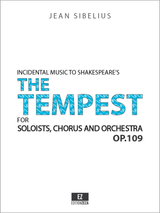
REPRINT SERIES
Op. 104 Symphony no. 6 in D minor
1. Allegro molto moderato, 2. Allegretto moderato, 3. Poco vivace, 4. Allegro molto. Completed in 1923; first performance in Helsinki on 19th February 1923 (Helsinki City Orchestra under Jean Sibelius).
The third and sixth symphonies are the least often played symphonies of Sibelius. After the heroism of the fifth symphony, the lyricism and apparent lack of drama in the sixth symphony confused the public. Yet the work was more accessible than the fourth symphony had been eleven years earlier
Around 1919-1920 Sibelius re-established his foreign contacts in a Europe which was rising from the ashes. Now he was able to give concerts in Denmark, Norway and Britain. His seven years of abstinence from alcohol were over, and he was again seen out on the town with his friends as in the days of his youth. However, after every celebration he shut himself up in his room for days on end and devoted himself to composing.
The sixth symphony thus became something of a purification rite: the Dorian mode predominates in the work; Sibelius is serving his audience spring water instead of party drinks. In the orchestration this shows itself as translucency, with bright sounds from the flutes and strings. The brass instruments, which played a major role in the fifth symphony, are now restrained, rarely disturbing the lyrical surface.
Sibelius found themes for the sixth symphony while working on the fifth, and some of the material was originally drafted for a lyrical violin concerto. Somewhat later Sibelius was for a time considering a work to be called Kuutar (Luna): thematic material from this also ended up in the sixth symphony.
The symphony was performed for the first time on 19th February 1923. The composer conducted the orchestra himself. The critics praised the "pure idyll" of the symphony, but they would clearly have wished for stronger dramatic contrasts.
Today the sixth symphony is recognized as a masterpiece. Its meaning often becomes accessible only after one has become familiar with the heroism of the second and fifth symphonies, or the profundity of the fourth and seventh symphonies.
- Difficulty:
- Intermediate
- Instrumentation:
- 2 Fl, 2Ob, 2Cl, BCl, 2Bsn, 4Hn, 3Tpt, 3Tbn, Timp, Hp, Strings
- Duration:
- 29 minutes
- Set of Parts:
- Includes Strings count 4.4.3.3.2
- Product Type:
- REPRINT SERIES






